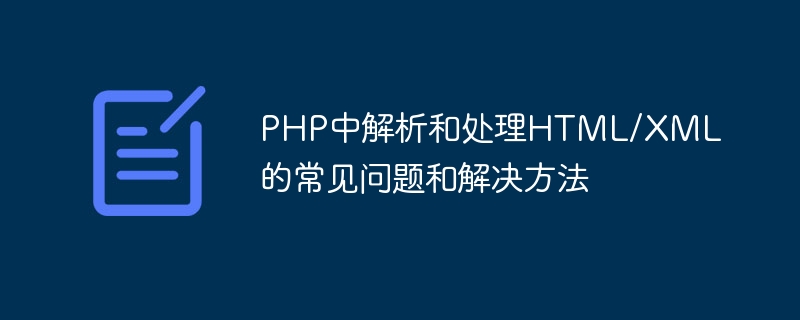Home >Backend Development >PHP Tutorial >Common problems and solutions for parsing and processing HTML/XML in PHP
Common problems and solutions for parsing and processing HTML/XML in PHP
- WBOYWBOYWBOYWBOYWBOYWBOYWBOYWBOYWBOYWBOYWBOYWBOYWBOriginal
- 2023-09-10 11:33:331350browse

PHP is a widely used server-side scripting language commonly used to develop web applications. During the development process, we often encounter the needs and problems of parsing and processing HTML/XML. This article will describe some common problems and solutions.
1. Parse HTML/XML
- Question: How to parse HTML or XML strings?
Solution: PHP provides a variety of parsers to parse HTML or XML strings, such as SimpleXML, DOMDocument, and XMLReader. You can choose an appropriate parser for parsing based on specific needs.
- Question: How to extract specific elements or attributes from HTML or XML files?
Workaround: After parsing HTML or XML, you can use XPath expressions to locate and extract specific elements or attributes. XPath is a language for navigating and querying nodes in XML documents.
- Question: How to deal with special characters when parsing HTML?
Workaround: Before parsing HTML, you can use the htmlspecialchars function to convert special characters into HTML entities to prevent parsing errors or security issues.
2. Processing HTML/XML
- Question: How to create and modify HTML or XML documents?
Solution: You can use the parser provided by PHP, such as DOMDocument or SimpleXML, to create a new HTML or XML document, and use the corresponding methods to modify nodes, attributes or text content.
- Question: How to verify the validity of an HTML or XML document?
Solution: You can use DTD (Document Type Definition) or XSD (XML Schema Definition) to define and verify the structure and specification of an HTML or XML document. PHP's parser also provides corresponding methods for verification.
- Question: How to format the output HTML or XML document?
Solution: You can use the formatting functions provided by PHP, such as htmlspecialchars, nl2br and wordwrap, etc., to format and beautify HTML or XML documents.
3. Frequently Asked Questions and Notes
- Question: How to process large HTML or XML documents?
Workaround: For large HTML or XML documents, you can use the XMLReader parser to read the document line by line without having to load the entire document into memory.
- Question: How to deal with nested tags?
Solution: When processing nested tags, you can use a recursive algorithm to process multi-layer nested tags to ensure that each tag can be parsed and processed correctly.
- Note: When parsing and processing HTML or XML, you should pay attention to security issues, such as preventing cross-site scripting attacks (XSS) and entity injection attacks. User input can be filtered using PHP's filter functions or escape functions to prevent security vulnerabilities.
Summary:
Parsing and processing HTML or XML in PHP are common development needs. By choosing the appropriate parser and methods, you can easily parse and process HTML or XML strings, files or documents. At the same time, paying attention to security issues and performance optimization can improve the stability and security of the application. I hope this article can help readers better understand and apply common problems and solutions to parsing and processing HTML/XML in PHP.
The above is the detailed content of Common problems and solutions for parsing and processing HTML/XML in PHP. For more information, please follow other related articles on the PHP Chinese website!

